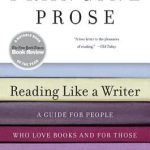 In Sister Bernadette’s Barking Dogs: The Quirky History and Lost Art of Diagramming Sentences, Kitty Burns Florey sets out to tell why diagramming sentences is so much fun and the brief history of the art of diagramming sentences. To some extent, I felt Florey’s book was more memoir and humor than it was history. Yet, I highly enjoyed the brief tribute to diagramming because I was one who was fascinated by the month I spent in seventh grade learning to diagram.
In Sister Bernadette’s Barking Dogs: The Quirky History and Lost Art of Diagramming Sentences, Kitty Burns Florey sets out to tell why diagramming sentences is so much fun and the brief history of the art of diagramming sentences. To some extent, I felt Florey’s book was more memoir and humor than it was history. Yet, I highly enjoyed the brief tribute to diagramming because I was one who was fascinated by the month I spent in seventh grade learning to diagram.
Florey’s tone is personal throughout the book – she reminisces of her own first experiences with diagramming, first when she visited a friend’s school while in fifth grade, then in sixth grade in her parochial school, where Sister Bernadette put the “barking dog” sentence on the board. Florey recalls why she liked diagramming so much, and throughout the book, she throws in geeky humor. It felt like she was trying to be as funny as, say, Mary Roach was in Stiff (thoughts here). But it kind of reminded me of me: I try to be funny but don’t always come across as funny. Florey’s “funny” was kind of distracting sometimes. She was also incredibly critical of George W. Bush’s grammar time and again, without mentioning many other politicians. I don’t personally like George W. Bush (grammar or politics) but it still got very exhausting to hear repeatedly about how dumb he is, especially for such a short book (150 pages).
But despite (or perhaps because of) the overall geekiness of sentence diagramming, I enjoyed reading Sister Bernadette’s Barking Dogs. It caused me to reminisce on my seventh grade class, when Miss Canning first put a diagramed sentence on the board. I liked diagramming because English suddenly became dividable and measurable, like math but still with words. There was a place for each word of the sentence, and it was a tricky assignment to get it right. I enjoyed it very much.
Florey does go beyond reminiscences. She details the birth of diagramming (Reed and Kellog), some very general rules of diagramming, and modern writer’s opinions of diagramming. She debates whether or not learning to diagram helps improve writing, and shares diagrams of the sentences written or said by various writers and politicians. Then she delves in to why sentence diagramming is no longer in fashion. She even visits a junior high class room today that is diagramming sentences: it sure sounds like fun to me! (Why, oh why, don’t kids do it anymore?!
My paperback copy of Sister Bernadette’s Barking Dog is used; one or two pages have some pencil writing in the margins. But the cover is fully intact and it looks (and feels!) like a new book.
Does this book sound like one that might interest you? Did (or do) you like diagramming? I’d like to send Sister Bernadette’s Barking Dog to someone interested in sentence diagramming.
To be entered into the giveaway, tell me at least one of these things:
- Who taught you diagramming that first time? (Who was your “Sister Bernadette” or “Miss Canning”?)
- When or where did you first learn diagramming?
- Why do you like diagramming (or the idea of diagramming)?
I’ll randomly select a winner next week.
If you have reviewed Sister Bernadette’s Barking Dog on your site, leave a link in the comments and I’ll add it here.




Oh yes! I love diagramming! I believe I learned it first in Mr. Tepper’s 9th grade English class, but i could be wrong. What really stand out to me is my college grammar class, when it became apparent who were the true grammar nerds, and who were just lit people.
I don’t know if this one is for me. I left you an award on my blog.
I learned to diagram in a class called “Grammar and Language” when I was a junior in college. My professor was Janet Ericksen, who is and was completely awesome. I think what I love about it is the way that a language as complicated and English can be compartmentalized and made clear simply through a picture — I think that’s amazing! Plus, I like the rule that if you can’t diagram your own sentence easily it’s probably too complicated (I think about that pretty often).
I would love to read this book!
OOh, please enter me. I am not sure I enjoy diagramming sentences, but I do like the idea of it — must be something about bring order to what appears to be disordered at first. I learned to diagram in my sixth grade at my Catholic elementary school…I didn’t have a sister teaching me, but all of my teachers back then were pretty militant diagrammers. I’m not sure I could do it today, though!
I’ve had my eye on this book for a while. I recently read Francine Prose’s Reading Like a Writer in which she discusses why understanding sentence structure is so important to being a good writer and a good reader. I first learned sentence diagramming in seventh grade from Mrs. Trexler. Thanks for the review and please enter me in the drawing. Thanks!
SmallWorld Reads, yeah, I think accepting the fact that I’m a grammar nerd was a big part of beginning diagramming!
Chris, awwww, thanks so much! So nice!
Kim, there is a chapter in this book about the complicated sentence thing: not always true because even Proust’s grammatically correct 900+ sentences can be diagrammed, it’s just a bit confusing!
Bibliolatrist, I realized as I read this book that I probably would fail at diagramming now too! I still like the idea of it too, though.
Lisa, I have had Prose’s book on my TBR for a long time! Must find it.
You’ve all been entered (except Chris is didn’t sound like you wanted to be).
Mrs. Ranney, 7th grade English. I don’t yearn to go back, but I probably had a pretty good time with diagramming. All those lines!
Alisa, I’m not sure I want to go back either, but it is fun to remember it being fun!
The randomly selected winner is Bibliolatrist! Congrats. I’ve sent you an email. Send me you address and I’ll send it to you.
Sorry it took a few days longer than I anticipated to choose a winner. I’ve been sick and I just forgot….